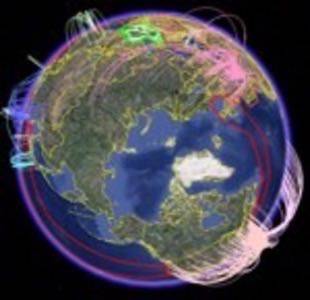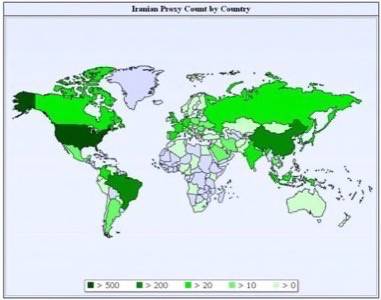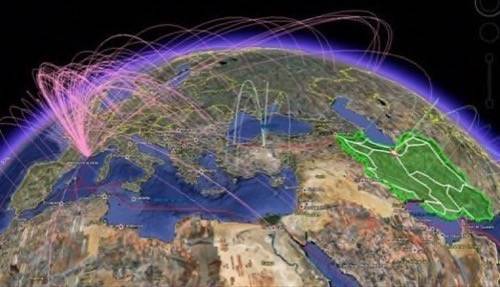Network analysts Renesys reported this morning that the global effort to supply proxy internet servers for Iranians to route around government control and communicate with the outside world is slowing down and facing increasingly effective state repression. The company mapped two thousand proxy servers shared on Twitter and other web sites over the course of the last week and found that it truly has been a global effort.

It can’t be assumed that all the proxies were created to support Iranian protesters, but they were probably all shared for that purpose. Renesys reports that the rate of proxy creation appears to have slumped dramatically over the last few days and newly shared proxies are now being added quickly to the official list of filtered destinations online. This could have consequences for the political movement’s global visibility and underlines how important it is for everyday people to create proxies and share them with friends overseas ahead of time.
We were lead to this report by enterprise analyst James Governor, who has consistently uncovered some of the best links to resources regarding Iran.
Renesys offers the following explanation of how proxies work:
A proxy server is a simple bit of software that you run on your computer. It effectively lets you share your computer with anonymous strangers as a “repeater” for content that they aren’t allowed to fetch themselves. For example, an Iranian web browser might be manually configured to use your computer (identified by an IP address and a port number) as a Web proxy. When your anonymous friend reads twitter.com, or posts a tweet, the request goes via your computer, instead of to Twitter’s web server directly. Except for a little delay, and the fact that your friend gets to see what the uncensored Internet looks like from New York or London or São Paolo instead of Tabriz or Qom, surfing through a proxy is pretty much like surfing without one.

The United States may have offered up more proxies than anywhere else, but the effort has truly been global. “The USA and Western Europe were well-represented, but so were China, India, Russia, Romania, Bulgaria, Vietnam,” the firm wrote today. “87 countries in all, a pretty impressive breadth of representation, considering the relatively small size of this sample.”
Unfortunately the construction of Iran’s sophisticated censorship system was a global effort as well; the Wall St. Journal reported this weekend that Siemens and Nokia sold the Iranian government the technology that’s being used to track down and silence protesters.

Renesys notes that public sharing of the proxies is making it too easy for the Iranian government to find and control them. The company suggests that it’s far better to create proxies and start sharing them with people living under repressive governments ahead of major conflict – “don’t wait until the tanks are in the streets to figure this out, because by that point, you may have already lost the proxy war.”
If you would like to think ahead and set up a proxy for sharing with friends who could need it, Glype.com is one service you might begin with.










